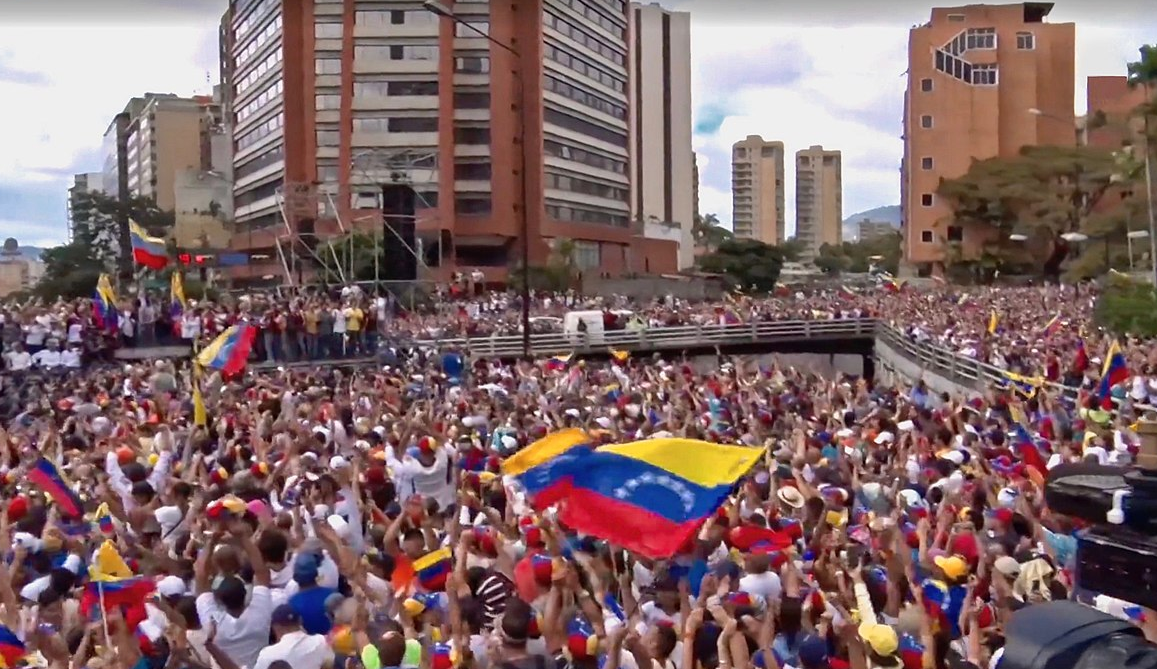
John Bolton: “Big difference” if “US oil companies invest in & produce oil in Venezuela”
What is being forgotten in the fight between Maduro and Guaido is that whoever wins, the impetus on the victor will be on maximising output from the country’s oil reserves to help alleviate the country’s crippling economic problems. Because much of this is heavy oil, it is extremely carbon intensive to produce. And that can only be bad news for the climate.

C: https://www.voanoticias.com
As political tensions mount in Venezuela, the issue of the US and its allies trying to enforce political regime change on a country is once generating significant news coverage.
However, are the US and its partners acting out of humanitarian interest or are there other issues at play?
As usual with international affairs, the issue is complicated and multifaceted, but it is hard to separate oil from Venezuelan politics, especially as the majority of oil production is undertaken by the state oil company PdVSA, which is currently in deep trouble.
Oil is central to Venezuelan politics. There have been over a hundred years of commercial development in the country and whilst it has brought some wealth it has also brought a huge amount of trouble. Let us not forget that it was a Venezuelan, Juan Pablo Pérez Alfonso, who was one of the founding fathers of Opec, who described oil as “the devil’s excrement”.
Although the country has potentially the world’s largest reserves of oil (if you include heavy oils), the recent history of oil exploration and production has been beset by political interference leading to mismanagement by PdVSA, which remains the main source of income for the regime of the incumbent President, Nicolás Maduro.
Many chart the problems at PdVSA back to Maduro’s mentor, Hugo Chávez. One former PdVSA board member who left the company when Chávez took power, says about Chávez: “He was ignorant about everything to do with oil, everything to do with geology, engineering, the economics of oil. His was a completely encyclopedic ignorance.”
As Keith Johnson wrote in Foreign Policy last year: In 2001, Chávez “pushed through a new energy law that jacked up the royalties foreign oil firms would have to pay the government. It also mandated that PdVSA would lead all new oil exploration and production; foreign firms could only hold minority stakes in whatever partnerships they struck with the national company.”
Over time Chávez fired many leading oil technocrats, leading to a company in perpetual crisis, which was exacerbated when the oil price crashed.
To quote Keith Johnson again: By the end of 2015 “Venezuelan oil was selling for less than $30 a barrel, even as the budget was predicated on prices of $60 a barrel. By this point, Venezuela had become nearly wholly dependent on oil revenues, which made up about 95 percent of its export earnings … And because Venezuela had neglected to diversify its economy, the country was out of options.”
In December last year, Venezuela’s crude production was just over 1.1 million barrels a day, just a third of its level in the mid-2000s. For a country dependent on oil, it had been a spectacular collapse: Francisco Monaldi, a Latin America expert at Rice University’s Baker Institute for Public Policy argues: “I don’t think we’ve ever seen a collapse of that magnitude [anywhere] without a war, without sanctions.”
As oil productions has plummeted, so have living standards. As an article in Time magazine points out “Venezuela is into its fifth year of economic crisis. Nine out of 10 households say they don’t have enough money to buy food. Nearly two-thirds go to sleep hungry at night.” Locals even call their pitiful diet “The Maduro diet.”
There is no doubt that Venezuela and Nicolás Maduro have been in Trump’s sights for a while, though, regardless of the poverty of the population. Last November, National Security Advisor, John Bolton labelled the country in his “troika of tyranny” speech, naming Venezuela, Nicaragua and Cuba. “The United States looks forward to watching each corner of the triangle fall: in Havana, in Caracas, in Managua.”
But is oil a factor too? As Al Jazeera notes: “The White House is very clear – it wants to overthrow the governments in Cuba, Venezuela and Nicaragua; and the US control over the world’s largest oil reserves.”
Last month, Bolton told Fox News: “We’re in conversation with major American companies now. I think we’re trying to get to the same end result here. … It will make a big difference to the United States economically if we could have American oil companies really invest in and produce the oil capabilities in Venezuela.”
You could see why America would be interested in securing the country’s oil and backing the opposition leader, Juan Guaidó, who declared himself interim president on 23 January.
As oil and politics are so closely intertwined, the logical way of trying to topple Maduro is to cripple, PdVSA by imposing sanctions. Last week, the US imposed sanctions on PdVSA, which will block $7 billion in assets and deprive Caracas of $11 billion in revenues in 2019.
As pressure mounts, Maduro has warned Trump he will leave the White House “stained with blood” if he tries to overthrow him.
But what is being forgotten in the fight between Maduro and Guaido is that whoever wins, the impetus on the victor will be on maximising output from the country’s oil reserves to help alleviate the country’s crippling economic problems. Because much of this is heavy oil, it is extremely carbon intensive to produce. And that can only be bad news for the climate.
As already mentioned, Venezuela has the largest reserves in the world, an estimated 298 billion barrels of proved oil reserves – much of it heavy oil – which is almost double that of Canada. If all that heavy oil is burnt, we will all be in trouble whether you support Maduro or Guaido.
